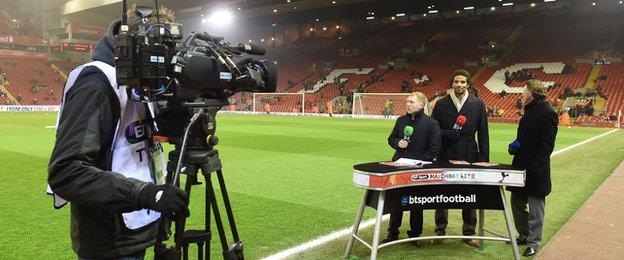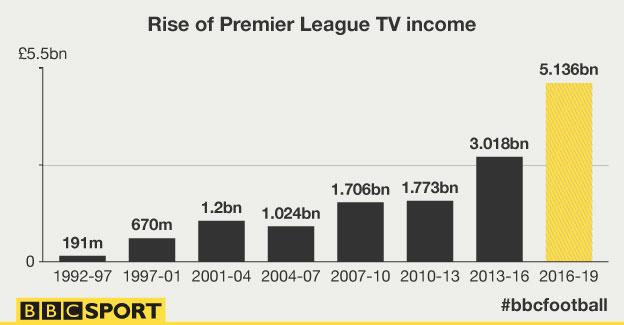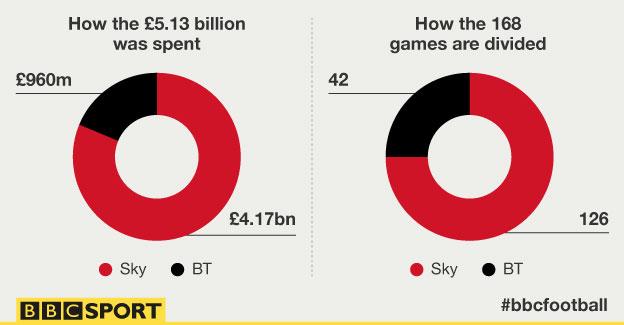Premier League TV rights: What does deal mean for fans & clubs
Last updated on .From the section Football
After Sky and BT Sport pay a record £5.136bn for live Premier League TV rights for 2016-17, BBC Sport looks at the changing picture for TV viewers and what the record rights package could mean for consumers.
How can £10.2m per game be good value for money?
The only answer to that question is because both Sky and BT believe it is. The breakdown of the bidding means Sky is paying an average of £10.8m for each of the 126 Premier League games it will broadcast each season from 2016-17 until 2018-19, and BT will pay around £7.6m for each of its 42 matches.
There are three reasons why these figures are so high.
The first is competition. There was interest from Discovery, which owns Eurosport, and BeIN sports, based in Qatar, and that interest has pushed BT and Sky to bid more in order to keep the rights.
The second reason is about choice. Sky has about 10.5m subscribers, but has never revealed how many of them buy sports channels. The bidding for the Premier League rights is about much more than sport. It is about being able to attract customers to buy broadband, landline and mobile packages alongside a comprehensive TV offering.
On Wednesday, Sky's shares opened more than 4% down, with BT's shares up more than 3%.
The third reason is the product itself, the Premier League. The audience tells rights holders it is as absorbing and interesting as ever.
Stoke City chairman Peter Coates said: "It is a bit over the top to call it obscene. It is an awful lot of money but we have a responsibility to football as a whole and I am sure we will exercise that responsibility."

What does this mean for viewers?
If the Premier League clubs, players, agents and sports car dealers are the big winners from this auction, the one potential loser is the viewer.
These huge sums of money must be covered and over the course of the next two or three years it would be a surprise if the price of TV packages do not rise to cover some of these costs.
The audiences on Sky and BT are huge. Around 1.6m watched the north London derby between Tottenham and Arsenal on BT last Saturday, with almost two million tuning in for the Merseyside derby on Monday. The money this generates for these companies cannot be underestimated.

Will the money roll down to grassroots and the Football League?
"It's what is known as the 'prune juice effect'," Lord Alan Sugar told BBC Sport. "It goes in one end and goes out the other."
The former Tottenham owner, who was involved in the first Premier League TV rights deal in 1992, added: "The more money that is given to clubs, the more money will end up being spent on players."
This issue is one of the most emotive. The Premier League was very quick to say it will invest £168m in "facilities and good causes" and build 152 artificial, all-weather 3G pitches.
It will also point to the huge tax revenue from players' wages and argue that more than a sixth of its overall income is distributed beyond the 20 clubs.
All of those contributions should also be seen against the backdrop of Premier League clubs paying agents £115m between October 2013 and September 2014.
But the reality for Football League clubs and below is that only around 5% of the Premier League's income filters down to grassroots.
FC United of Manchester, who play in the Northern Premier League, tier eight of the English football pyramid, are attempting to raise money to fund their new stadium. It would be used as a community hub, a centre for kids and youth club. That could be paid for with the amount of money Sky or BT is spending to broadcast one live match.
Former Football Association chief executive Mark Palios, who is now executive chairman at League Two side Tranmere Rovers, said: "You can't defend the issue of player wages. The issue is that the money coming down to grassroots is not entirely correct.
"The Premier League do provide a large amount of cash into grassroots but the problem is the structure and efficiency of British sport and how the money is divided.
"Politicians can say money needs to be input into grassroots but they should have a look at themselves and the structure they have set up."
What does this deal mean for Premier League clubs?
It is great news. This incredible sum of money means the club that finishes bottom of the Premier League in the 2016-17 season will pocket £99m.
The champions will earn more than £150m in prize money and that is before additional fees are paid to clubs who stage more TV matches than others.
In the past, there have been increased TV deals spent on better players, bigger transfer fees and higher wages. That is likely to happen again, at least to some extent, and may even help England's best clubs bridge the gap to the likes of Real Madrid and Barcelona in the Champions League.
It also means that all 20 Premier League clubs could break into the top 30 richest clubs in the world - currently they all occupy a place in the top 40. Burnley are richer than Ajax.
But this deal takes the Premier League into a new stratosphere and is bound to have a lasting impact on the field. It may not be long until the days of the first £100m Premier League player, who is paid £500,000 per week.
Premier League chief executive Richard Scudamore told BBC Radio 5 live: "In 1986 there was no one that wanted to broadcast football. There was not even a highlights programme.
"From the dark days of stadium disasters and other things, it's an amazing rise. We now put on a show that people want to watch and attend - and in ever increasing numbers. There's more interest than ever before."
What about the fans at the ground?
They could, potentially, be the other winners. Scudamore said he hopes the clubs do not spend all their money on players and agents.
The BBC's Price of Football Study showed that ticket prices continue to rise at a rate that outstrips inflation and the figures prompted many to concede enough was enough. This TV deal would appear to be a genuine opportunity for clubs to pass some of this huge wealth on to the fans.
Malcolm Clarke, chairman of the Football Supporters' Federation, said it would allow the clubs to lower prices and still leave them with more money than they have had before. But it remains to be seen if this will be the watershed moment so many fans hope it will be.
A statement from Supporters Direct said: "Our member supporters' trusts in the Premier League have been campaigning strongly and vociferously for lower ticket prices - particularly given the effect that these broadcasting deals are having on kick-off times.
"We back their calls and those of the Football Supporters Federation on that issue."

Have we reached a peak?
Probably not. As astonishing as that sounds, the Premier League remains an incredibly attractive proposition, not only in this country but across the globe.
Market forces and competition are driving these prices and even off the back of a recession, that demand is still very much there. As the economic climate continues to brighten, it is hard to see these figures not continuing to rise, at least for one more round of auctions.
It is also worth remembering that now that the domestic rights auction has been settled, attention will turn to the global TV companies and how many they are willing to pay for rights.
That will be another record number and more good news for the clubs. Financial experts no longer attempt to predict when the Premier League bubble will burst.
Lord Sugar suggests the peak will only be dictated by the broadcaster's profits: "There will come a stage where if their income from their subscribers start to decline and they don't have the surplus amount of money available to pay for the rights, it will plateau out."
The Premier League: A 'global powerhouse'
The Premier League is one of the great British success stories. It will always be a target for scorn and criticism and that is understandable if only because of the unimaginable sums of money involved and because it makes the very richest even richer.
But from a commercial point of view, from the standpoint of how much income tax the players involved pay to the state, this outstrips almost any other sports league on the planet. Only the NFL generates more income.
This incredible rise may not last forever, but the Premier League's enduring appeal and pure entertainment value means that many cannot vividly remember the time before the Premier League existed. This is a truly global powerhouse and there is much to celebrate.